Art Therapy Takes New Form of Healing for Military Service Members
By Katie Berland,
NMHM Public Affairs Specialist
Melissa Walker, a credentialed art therapist, aims to provide a special kind of healing experience for her patients – U.S. military service members. Walker took the stage at the National Museum of Health and Medicine (NMHM) in Silver Spring, Maryland, on August 30, 2016, at the monthly Medical Museum Science Café to discuss the art of "Unmasking the Trauma of War."
At the National Intrepid Center of Excellence (NICoE) at Walter Reed National Military Medical Center, a unique healing arts program has been developed. The NICoE's four-week program takes service members who have suffered traumatic brain injury (TBI), and other psychological health conditions, including post-traumatic stress disorder (PTSD), and immerses them in a safe and healing environment. "It's a patient-centered holistic model," Walker said. "It allows these service members to holistically learn about themselves, process what they've been though, and take the next steps."
As part of the art therapy process, patients are encouraged to express their feelings and experiences though creation –taking the form of a mask of their own design. Walker said "most of them are a little hesitant at first, but it doesn't take long for them to warm up to the idea of the project." Walker explained to the audience that some patients choose to leave their masks behind after the program has ended, as if to serve as a sense of motivation for her future patients.
"I think this is what helps open them up to the idea. Seeing the masks created by fellow service members promotes a sense of comradery." Creating the masks is more than just an art project – "it allows these wounded service members to take their psychological issues and fears and turn them into something physical and healing," she continued.
During the presentation, she showed a neuroimaging scan from the brain of a patient. The area of the brain responsible for speech and language showed less responsiveness, which is common in individuals diagnosed with PTSD. This trauma "makes it very difficult for them to process and vocalize what has happened to them," Walker stated. The Healing Arts Program aims to make it easier for patients to accept and process what has happened to them through a variety of creative arts therapy methods. Each patient goes through various types of therapy that is specifically tailored to help service members depending on the severity of their needs. Music therapy, therapeutic/creative writing, dance/movement therapy, and art therapy help them unlock their experiences and express their emotions in a safe, creative and supportive environment.
For one of her long-term patients, art therapy continues to have a profound impact on the way he processes what has happened to him. For years, the patient suffered from what she referred to as Bloody Face in Bunker (BFIB). Terrible flashbacks plagued his thoughts and dreams, stemming from his experience while deployed. After going through the NICoE program and creating a mask that represented what haunted him, he began to improve dramatically. "He told me that he had only seen Bloody Face once or twice since he created the mask," said Walker. As for the mask, it still remains safe and contained in Walker's studio as a reminder to its creator of the powerful healing art therapy has.
Over time, she began to realize that a series of patterns had emerged regarding the themes of the masks. Some of the key topics of creation for a variety of her patients include patriotism, the uniform, the injury, death/grief, a sense of split self and compartmentalization/fragmentation. NICoE began to gather data from the masks, and is able to track how this therapy has had by correlating the service members' incoming PTSD and generalized anxiety scores with the themes depicted in the masks. Because of the positive impact and attention this program has received, including a feature story in National Geographic Magazine, other treatment programs have expanded to include art therapy and are giving hope back to those who didn't know of the positive impacts the creative arts therapies could provide to them. "We see their affects change, as well as their ability to be open with their providers, families, and each other," Walker said.
Following the talk, guests were able to explore the temporary exhibit and speak with Walker about her work. As an added bonus, art made in France during World War I were available for review from the NMHM historical collection. Some of the historical artifacts included prints, carved wood blocks, and other 2-D materials such as cards, embroidery, and a cartoon. Ceramic artifacts from World War II were also on display.
A selection of masks from this unique program will be on display at NMHM until September 23. Guests are welcome to explore how these masks truly capture the pain, grief, misunderstanding and trauma that so many service members experience after returning from their deployments.
NMHM's Medical Museum Science Cafes are a regular series of informal talks that connect the mission of the Department of Defense museum with the public. The next Science Café "Military Medicine's Investment in Global Health Engagement" will take place on September 24, 2016, and will explore the DoD's approach to global health engagement, and building relationships and partnerships across the world.
NMHM was founded as the Army Medical Museum in 1862 and moved to its current location in Silver Spring, Maryland, in 2012. NMHM is an element of the Defense Health Agency. For more information on upcoming events, please call 301-319-3303 or visit www.medicalmuseum.mil.
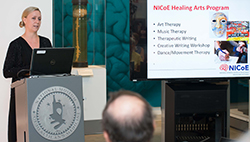
|
Caption:
Melissa Walker, Art Therapist and Healing Arts Program Coordinator at the National Intrepid Center of Excellence (NICoE),
Walter Reed National Military Medical Center, speaks during the August Medical Museum Science Café titled "Unmasking
the Trauma of War: Art Therapy with Military Service Members." The monthly informal talk was held Tuesday, August 30, 2016,
at the National Museum of Health and Medicine in Silver Spring, Md. (National Museum of Health and Medicine photo by Matthew Breitbart / Released) |
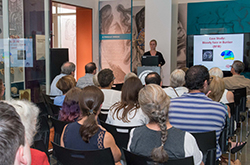
|
Caption:
Melissa Walker, Art Therapist and Healing Arts Program Coordinator at the National Intrepid Center of Excellence (NICoE),
Walter Reed National Military Medical Center speaks during the August Medical Museum Science Café titled "Unmasking
the Trauma of War: Art Therapy with Military Service Members." The monthly informal talk was held Tuesday, August 30, 2016,
at the National Museum of Health and Medicine in Silver Spring, Md. (National Museum of Health and Medicine photo by Matthew Breitbart / Released) |
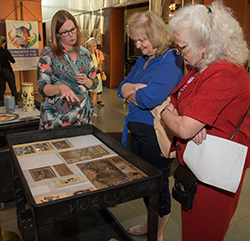
|
Caption:
Andrea Schierkolk, public programs manager (left) at the National Museum of Health and Medicine (NMHM) in Silver Spring, Md.,
reviews a series of historic art works from the NMHM archives on temporary display during the August Medical Museum Science
Café titled "Unmasking the Trauma of War: Art Therapy with Military Service Members." The monthly informal talk was held
Tuesday, August 30, 2016, at NMHM. (National Museum of Health and Medicine photo by Matthew Breitbart / Released) |
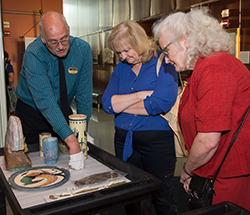
|
Caption:
Alan Hawk, historical collections manager (left)at the National Museum of Health and Medicine (NMHM) in Silver Spring, Md.,
reviews a series of artifacts from the NMHM collections on temporary display during the August Medical Museum Science Café
titled "Unmasking the Trauma of War: Art Therapy with Military Service Members." The monthly informal talk was held Tuesday,
August 30, 2016, at NMHM. (National Museum of Health and Medicine photo by Matthew Breitbart / Released) |
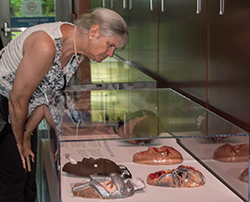
|
Caption:
A visitor examines a temporary exhibition of art therapy masks on display at the National Museum of Health and Medicine (NMHM)
in Silver Spring, Md. The masks are on loan to NMHM from the National Intrepid Center of Excellence (NICoE), Walter Reed National
Military Medical Center. (National Museum of Health and Medicine photo by Matthew Breitbart / Released) |
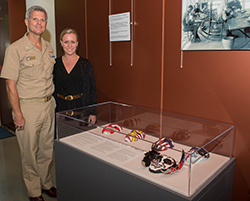
|
Caption:
CAPT Walter M. Greenhalgh, USN, Director, National Intrepid Center of Excellence (NICOE), Walter Reed National Military Medical
Center (left), stands with Melissa Walker, Melissa Walker, NICoE Art Therapist and Healing Arts Program Coordinator, next to a
temporary exhibition of art therapy masks on display at the National Museum of Health and Medicine in Silver Spring, Md. Walker
spoke at the August Medical Museum Science Café titled "Unmasking the Trauma of War: Art Therapy with Military Service
Members." The monthly informal talk was held Tuesday, August 30, 2016, at NMHM. (National Museum of Health and Medicine photo by Matthew Breitbart / Released) |



